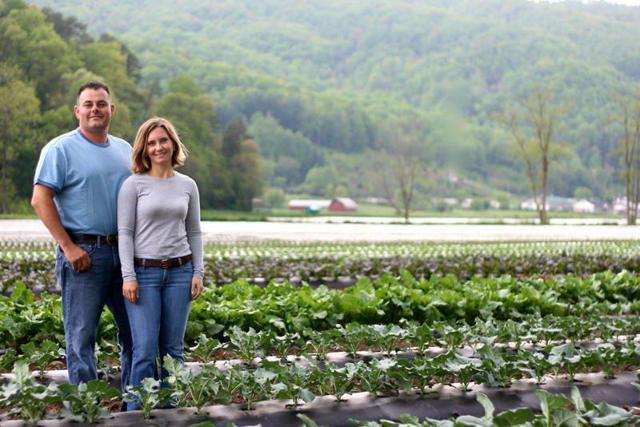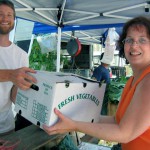- Raising Cane: Amanda Sizemore and her husband, Jeremy, at Cane Creek Valley Farm in Fletcher. They currently grow more than 100 different varieties of vegetables and herbs at their operation. Photos courtesy of ASAP
- What’s in the box? Alex Brown of Full Sun Farm hands over a customer's CSA box, filled with farm-fresh veggies.
It’s time to choose a CSA, and on March 29, ASAP will host a fair to help. This article is the first in a series of two profiling farmers who will exhibit. This week, we talked with seasoned CSA farmers. Next time, we’ll focus on some of the participating farms new CSAs.
A bumpy road
Farming as a career isn’t the easiest path. But farmers who offer Community Supported Agriculture programs say the approach makes it easier.
CSA farmers are able to ask subscribers to pay at the start of the growing season for shares of their farm’s bounty later on. Throughout the spring and summer (sometimes in the fall and winter, too), the farmers provide subscribers weekly with boxes of everything from fresh veggies, to meats and eggs to flowers.
“Subscribers’ direct support has a huge impact,” says Amanda Sizemore of Cane Creek Valley Farm in Fletcher, a certified organic farm now in its fourth year of offering a CSA. “Members reduce the financial risks for the farmer and also allow the farm to focus on growing food, instead of trying to sell what they grow on open markets that fluctuate. They give the farm stability and flexibility, and in return preserve farmland in their community and receive healthy, fresh foods from the hands of people they know and trust.”
Risk management
Vanessa Campbell of Full Sun Farm in Leicester agrees that subscribers provide more stability for farms. She began farming in 1997. Her partner, Alex Brown, joined the farm in 2000, and they needed another revenue stream. “The pay-up-front nature of the CSA program allowed us to pay for seeds, make repairs and buy new equipment in the late winter and early spring without going into debt,” she says.
Since those first-time subscribers received their shares in 2001, Campbell and Brown’s farm-share program has grown from 24 shares to 55. They’ve also adjusted their game plan to provide subscribers with more steady supplies of their favorites: lettuce, tomatoes, onions, potatoes and garlic. Most of the initial members are still part of the program.
“We have about 10 families that have been with us for 10 or more years,” they say. “Many CSA families have children, and they share stories about how their kids will only eat broccoli if it was grown from our farm. That sense of community and sharing the farming experience on different levels has always been important to us, and at times it keeps us going through tough farming adventures.”
R is for relationships
Sizemore echoes the notion that subscriber relationships — a much more fuzzy-feeling R-word than risks — are another reason CSAs make farming more manageable.
“We began our CSA program in 2009, the wettest season we’ve ever had to farm through, and that season was tough,” she says. “But, many of our CSA members were unfazed by its surprises and joined again the next year.” That includes neighbors she says they wouldn’t have met otherwise.
Cane Creek currently has more than 100 members that have stayed with it since that first, trying season. She and her family will offer 500 shares this year, making them the largest CSA operation in the area. The way they see it, the more the merrier.
“I love the attitude of CSA members,” Sizemore says. “They are a wonderful group of people. They love to feel connected to their local farmer and support a farm they believe in, and they look forward to the surprise each week when they open their box.”
Magical mystery box
Speaking of surprises, both Cane Creek Valley Farm and Full Sun Farm offer some for subscribers. For Cane Creek Valley members, it’s an annual farm day — think hay rides and guided tours of their dairy, chicken house and fields. They also offer special farm cooking classes for members, some in their kitchen and some even out in the field. Full Sun Farm subscribers are invited to a farm party, too, and they also get a few surprises in their weekly boxes. “We sometimes include honey from our beehives and sorghum molasses that we grow and then process using draft horses at a friend’s farm in Madison County,” the duo says.
Both farms’ CSA boxes are filled to the brim each week primarily with vegetables, but there are other options as well. Full Sun Farm offers flower shares — a bouquet a week for about 20 to 22 weeks, depending on frosts. Cane Creek Valley Farm offers eggs with their CSAs, and they also offer all natural beef and pork packages separately year-round.
Find These Farmers (and More) at the Fair
Cane Creek Valley Farm and Full Sun Farm are just two of 19 farms exhibiting at ASAP’s second CSA Fair, a free event to be held on March 29, from 3 until 6 p.m. at the Grove Arcade in downtown Asheville. Find a full list of vendors, and more information, at http://www.asapconnections.org/csafair.html.
Farmers will be on hand to discuss their offerings, the costs of their shares and other details. For example, Full Sun offers working shares at a discounted rate for those who want to get their hands dirty and truly connect with their food. While there, you can sign up to learn more or sign up for a share on the spot. Many farms will also sell and sample their CSA products and value-added farm items.
Expect to find a variety of CSA farms, diverse in their offerings, size of their programs and in the time of year the farms offer their products. This year’s event will include many newcomers to the CSA model — some first-time farmers, some longtime farmers expanding their offerings — hoping to gain lifelong subscribers like the farms profiled here. Stay tuned to the next Eatin’ in Season for their stories.
Can’t attend the fair? Browse the nearly 100 area farms offering CSAs in ASAP’s online Local Food Guide at http://www.buyappalachian.org. There, you can find all the details about area programs, including pickup locations, cost and more.
Cane Creek Valley http://www.canecreekorganics.com can be reached at info@canecreekorganics or 338-0188. Full Sun Farm (http://www.fullsunfarm.com) can be reached at fullsunfarm@gmail.com or 683-1607.
— Maggie Cramer is communications manager at ASAP. She can be reached at 828-236-1282 ext. 113 or maggie@asapconnections.org.





Before you comment
The comments section is here to provide a platform for civil dialogue on the issues we face together as a local community. Xpress is committed to offering this platform for all voices, but when the tone of the discussion gets nasty or strays off topic, we believe many people choose not to participate. Xpress editors are determined to moderate comments to ensure a constructive interchange is maintained. All comments judged not to be in keeping with the spirit of civil discourse will be removed and repeat violators will be banned. See here for our terms of service. Thank you for being part of this effort to promote respectful discussion.